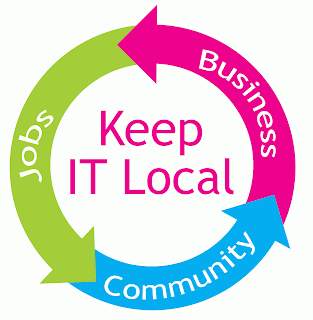We are in the midst of the busiest shopping season of year and Echo Pharmacy has a tip to help you save money and help your community at the same time! It's simple! Just shop local!
There is a misconception that larger chain stores always have lower prices than the smaller locally owned stores and that the chains generate more local revenue. However, study after study has shown this is not the case!
Big chains say that building their stores will generate local jobs and bring additional revenue into the community. The reality is that chains will often clone existing buildings which means there will be no need for the local planning such as architects and engineers. Also, the materials are ordered in bulk from their suppliers rather than through local suppliers. In contrast, a local business will hire architects, accountants, engineers, sign makers, contractors and so many more local businesses which will keep the money right in the community. Does the chain bring more sales revenue to your community? Not according to an extensive study conducted at Iowa State University. It concluded that sales simply shift dollars away from existing local merchants.
How about choice and selection of products? Once again, local businesses are more likely to purchase inventory from local retailers which keeps the local economy strong. The small business owner is more in tune with the wants and needs of the people in it's community and will be able to stock their stores appropriately. Big chains have few buyers tasked with buying merchandise for all of their stores. The selection will not be made with the specific community in mind. For example, think of the big department stores in Florida that stock wool sweaters starting in October, but no shorts. This does not fill the local need!
Buy from a local business and their profit will go right back into your community. With the big chains, the profits are exported to the corporate headquarters and away from your community. Over the past twenty year, sales of the largest 500 corporations grew 700% while they became disemployers meaning that they fire more people than they hire. Our economy pushes forward because of the employment provided by small businesses.
Get to know your local shop owners this season. You may be surprised by the selection you find in their stores as well as the competitive prices. At Echo Pharmacy, prescriptions are often less expensive than at the big chains. Plus, we get to know you and offer personalized care. We are active in the community and work hard to make this area a great place to live and work. Come on in. We'd love to meet you!








